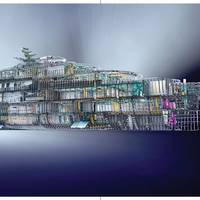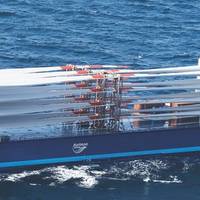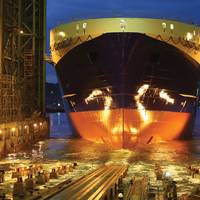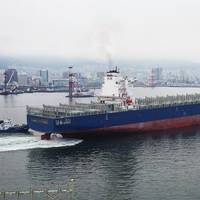Shipyard Report: Abeking & Rasmussen

111 years of success by designWhen Georg Abeking and Henry Rasmussen from Denmark established their boat and yacht yard 111 years ago, it is likely that neither of them suspected at that time that their small shipyard, headquartered in Lemwerder next to Bremen, would one day evolve into a world-renowned company known for building first class vessels.Today the company, which has been transferred into a European Company (Societas Europaea, SE), is a company that designs and manufactures, among other things. Included in this mix are some of the world’s most luxurious yachts.
German Shipowners Get Back to Basics

The situation for the shipping companies based in Germany has been, much like the rest of the world in 2017, mostly tight. Currently, the German shipping companies are undergoing changes against this background. They are concentrating more and more on their core competences. Maritime Reporter & Engineering News' man in Germany, Peter Pospiech, recently talked to Alfred Hartmann, President of the VDR (Association of German Shipowners), for his exclusive insights on the size, shape and direction of German shipowners.Mr.
Editorial: BWTS. Like it or Not, Here it Comes

With age comes perspective, and in my 20 plus years reporting on this industry I have seen my fair share of regulation that has served to ‘raise the hackles’ of ship owners. It is quite simple really; new regulation often means new procedure, new design, new equipment and new costs. With the possible exception of the new rules in the wake of the Exxon Valdez which mandated double hulls on tankers, the Ballast Water Management System issue is the most acrimonious debate I have witnessed.
Special Vessels “Built by Flensburger”

Flensburger Schiffbau-Gesellschaft, FSG, was founded in 1872 by a group of five local ship owners who previously had all their steamboats built in England as most German ship owners did in the 19th century. The first ship, the iron tall ship Doris Brodersen, was delivered to one of the founding partners in 1875. The cargo steamer Septima was commissioned a year later. In 1892 a floating dock, with a capacity of 2,300 tons has been built. At the turn of the year 1900, more than 2c000 employees worked at FSG.
Editorial: Gas ... It's Both the Question & the Answer

When the time comes to pull an edition together, sometimes the content simply takes on a life of its own, as is the case with the July 2014 edition and the proliferation of ‘gas’ throughout. While the advent of gas and all that this little word encompasses is hardly breaking news, to put it in context we literally are in the infancy of a historic course correction that will last generations. Following up on last month’s interview with Edward Scott, COO of Excelerate Energy (www.marinelink.com/news/excelerate-energy-year371540.aspx) this month Patricia Keefe…
Unmanned Ships Now a Reality
Drones do it and spacecraft have too, for many years. Recently, also, automobile makers and small boat makers have introduced their first autonomous vehicles on the streets, and waterways. Unmanned vessels on the ocean is no longer a dream – it is a reality. And according to those in the know, the reality will really start to come to fruition in the coming decaded. The MUNIN project (Maritime Unmanned Navigation through Intelligence in Networks) is investigating potential concepts for a fully or partially unmanned merchant vessel. The case ship is a dry bulk carrier of handymax size, operating on routes between Europe and South America in the beginning.
Pull the Handle Down...

One of the most effective and easiest fuel reduction operations is reducing the engine power by reducing the speed of a vessel. Out of the total operational costs of a vessel, fuel costs account for, by far, the highest proportion. When fuel prices soared, the technical experts of one of the world’s biggest shipping companies set about to solve the problem, and slowing down was the solution they devised. By 2009 significant fuel savings resulted from sailing its ships at 12 knots instead of 24, and ”Slow Steaming” officially became the standard operating procedure in their fleet.
MV Cellus

It’s not new, but is MV Cellus one of the cleanest ship in the world? Quick question: When the words “Green Shipping” and “German Maritime” are put together, is the first thought in your mind modern cruise ships? If you answered yes, it would be understandable; but partially right, partially wrong. Recently Maritime Reporter & Engineering News German-based contributing editor Dipl.-Ing. A simple German freighter is a bonafide trendsetter for clean ships operation, becoming the first seagoing ship to earn the “Blue Angel” eco-label, the oldest eco-labeling of Europe.
CO2 & the Environment: A “Not Guilty” Verdict?

Governments of the world continue to encroach with increasingly stringent emission legislation – of the in no way scientifically proven debate – creating a situation that puts vessel owners and operators of engine driven transport equipments of all kinds under growing legal and financial burden. But, what role does soot and CO2 really play for the environment and the global warming? Maritime Reporter & Engineering News German-based contributing editor Dipl.-Ing. Peter Pospiech takes a closer look to this question and delivers some interesting analysis.





